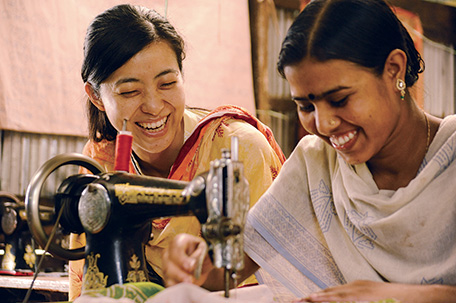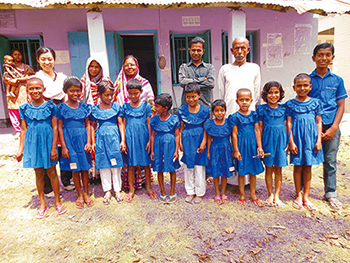Stories from the field 09
Generating Income with Sewing Work in an Effort to Encourage Female Independence in Rural Villages
– Supporting Activities by Cooperatives in Bangladesh

Ms. Toki (left) teaches a union member how to use a sewing machine. (Photo: Miwa Toki)
In November 2007 Cyclone Sidr killed 4,234 people and caused unprecedented damages to much of Bangladesh, one of Asia’s poorest countries. Children without Borders (KnK), a certified non-profit organization, has carried out activities to help the victims of five villages in Pirojpur District located along the country’s southern coast since 2008 as part of Japan’s assistance. This district, which had already been facing issues of poverty for some time before, became even more distressed following the cyclone, causing an increase in the number of children who could not attend school and teens who were sent away from home to work.
One way of improving the situation for children is for not only fathers but also mothers to earn an income. In December 2012 KnK initiated the Women Empowerment in Pirojpur District utilizing Grant Assistance for Japanese NGO Projects.1 This project helped women earn an income by teaching them sewing or weaving so that families did not rely only on the income of males, who typically work in agriculture or fisheries which are susceptible to the effects of weather. A cooperative was established to increase jobs and improve their sewing skills with the goal of helping the establishment of a mechanism for improved and stable income.
Ms. Miwa Toki was dispatched locally to head up this project. During her time at university Ms. Toki learned about environmental issues and studied abroad in the U.K. While abroad, she traveled to Asia and Africa and through these experiences she wanted to become involved in the sustainable development of developing countries. After graduation, Ms. Toki worked for several private sector companies including an IT consulting firm and also an environmental venture company, and she was selected to be dispatched to Bangladesh because of her private sector background and business experience.
At that time, the cooperative was producing various general goods ordered by KnK. However, it was difficult for the women locally to translate order emails from Japanese, source the materials, split up production duties, and ship products to Japan without the assistance of a Japanese staff member. Also, given the different sense of product design and quality, it was also quite difficult for the local women to create products to meet the demands of consumers in Japan.
“Our mission was to build a mechanism for generating continual income for women in the limited period of only three years. I considered changing the activity plan knowing that it would be meaningless if these activities did not continue after we left.”
Ms. Toki noticed something. The women had received requests from villagers to tailor clothing in private. It was more realistic to increase orders from the local community based on demand already present locally.
“Our job is to provide guidance in terms of sewing skills and business acumen. Each member receives orders for tailored clothing from villagers and uses the cooperative’s sewing machines to make them. Besides, when marketing large jobs that were impossible for an individual to do privately, I encouraged them to invite other cooperative members to help out.”
One major accomplishment of the cooperative was receiving an order for elementary and middle school uniforms. Together with staff, Ms. Toki and the women researched when and how uniforms were ordered, and also who was in charge of placing the order. Additionally, they demonstrated the fact that the women could make uniforms at a workshop in which school principals attended.
“There was a major hurdle for uniform sewing. Male students wear collared shirts, but the women did not know how to sew this type of shirt. First, the techniques were learned by a sewing instructor who then taught the women. The shirts created during practice sessions were given as a present to the husbands and fathers of the women. This strategy paid off. The husbands and fathers who initially were opposed to the idea of women working outside the home were seen proudly wearing their shirts around the village, becoming a walking advertisement so to speak, and supporting the jobs of women and daughters in the process.”

The finished uniforms are delivered to the school. (Photo: Miwa Toki)
These activities were successful. The number of orders doubled from 397 uniforms from 10 schools in 2014 to 758 uniforms from 38 schools in 2015. As a result, the income of the women working at the cooperative increased 20% during this period.
The activities of the women not only increased their household’s income and cash flow, but also gave the women their own money to use as they saw fit and the sense of great confidence of achieving business success on their own.
“Having developed their skills and self-confidence, I believe that these women will have the power to overcome any change that may present itself in the future.”
Development assistance should not be forced upon anyone. It must be something that is closely rooted in the society and lifestyle of the people actually living there. Ms. Toki learned about this in the field in her role of creating a business structure together with the women of the cooperative. The project ended in December 2015, but KnK will continue to oversee jobs for women in Bangladesh in the future.
*1 Grant Assistance for Japanese NGO Projects is a scheme by which the Ministry of Foreign Affairs offers funding cooperation for economic development projects and emergency humanitarian projects carried out by Japanese NGOs in developing countries and regions. The goal of this scheme is to enhance the capabilities of NGOs in expanding their international activities by helping them accumulate more experience.
<< Previous Page Next Page >>
Main Text | Statistics and Reference Materials | Stories from the field | Master Techniques, From Japan to the World | ODA Topics
